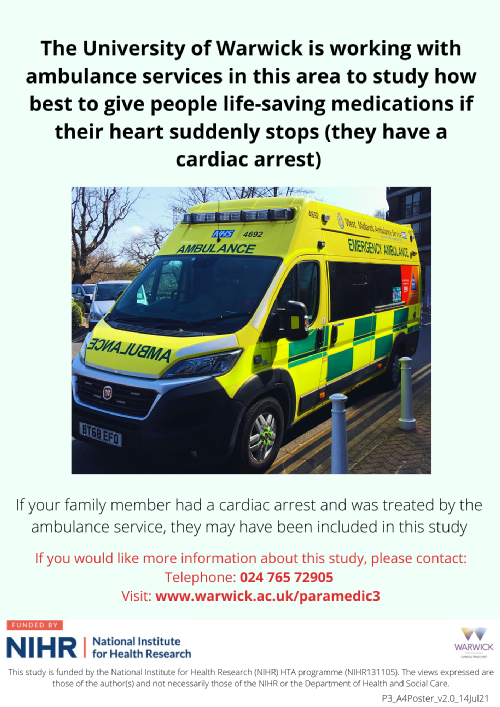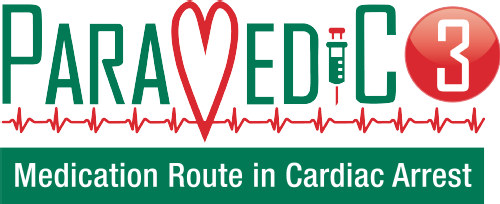Information for the public

Why is the trial being carried out?
Each year over 30,000 people’s hearts suddenly stop beating in communities around the UK (a condition known as
out-of-hospital cardiac arrest). Drugs such as adrenaline are widely used to treat cardiac arrest as they are very effective at restarting the heart. The sooner these drugs are given the better the chance is that they will be successful. However, for many people drugs are given too late to save them. This partly explains why less than one in ten people survive an out of hospital cardiac arrest.
Currently, paramedics normally give drugs into a vein. The problem with this is that it can take several critical minutes to get lifesaving drugs into a vein. A new, faster way of giving drugs is to put a small needle into an arm or leg bone. This allows drugs to be injected directly into the rich blood supply found in the bone marrow. We do not currently know which is the best approach as none of the existing research is good enough to help paramedics decide how best to treat people with cardiac arrest.
When doctors, nurses and paramedics do not know the best way to provide a treatment it is common to do a study. In this study those enrolled are put in to two groups – half received drug treatment through a vein and half received it through a bone. At the end of the study the results will be compared to see if one is better. To try to make sure the groups are the same to start with, each patient is put into a group by chance (randomly) through a process called randomisation.
To learn more about what is a cardiac arrest please click here.Link opens in a new window
Aim of the study
The aim of the study is to find out if giving drugs through a vein or into the bone is the most effective way to treat
someone when their heart suddenly stops working and whether it makes a difference to how well people recover after
cardiac arrest. We plan to test whether injecting drugs into the vein or the bone is most effective.
Who will take part in the study?
NHS paramedics in England and Wales will recruit patients in to the study from the UK only. The trial closed with 6082 participants recruited.
Patients will be recruited in to the study if they appear to be 18 years or older, have a cardiac arrest outside of hospital, in areas where ambulance services are taking part in the study. Patients who are pregnant, under the age of 18 or cannot be given drugs because the NHS paramedic cannot access their vein will not be included.
To learn more about the trial please visit our Frequently Asked Questions for Patients and the Public.Link opens in a new window
Study Results

Trial OverviewLink opens in a new window
About cardiac arrestLink opens in a new window
Support for the trialLink opens in a new window
Information for the publicLink opens in a new window
FAQsLink opens in a new window
News and eventsLink opens in a new window
PublicationsLink opens in a new window
Contact the teamLink opens in a new window
Enquiries:
Please direct all enquiries for the PARAMEDIC-3 trial team.
Email: paramedic3@warwick.ac.uk

